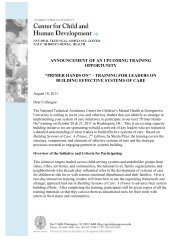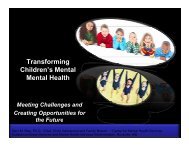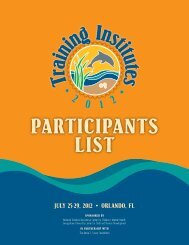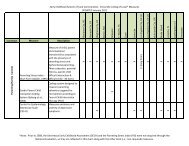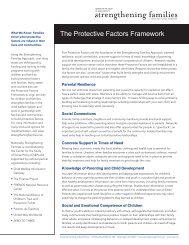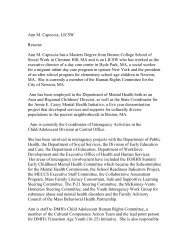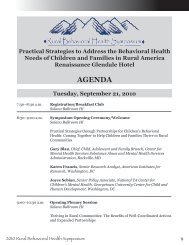Training Institutes 2012 - National Technical Assistance Center for ...
Training Institutes 2012 - National Technical Assistance Center for ...
Training Institutes 2012 - National Technical Assistance Center for ...
Create successful ePaper yourself
Turn your PDF publications into a flip-book with our unique Google optimized e-Paper software.
INSTITUTE #23 8:30 AM FRIDAY • 1:30 PM SATURDAY • MIAMI 1-2<br />
Serving Youth with Co-Occurring Substance Use and Mental Health Challenges<br />
INSTITUTES<br />
OBJECTIVES—Participants will learn:<br />
1. To describe youth with co-occurring mental health and substance use disorders and the unique challenges related to<br />
the service system <strong>for</strong> this population<br />
2. To explain the perspective and role of families of children with co-occurring disorders and strategies <strong>for</strong> supporting<br />
youth and family voice and cultural competence in all aspects of care<br />
3. To identify the principles, system infrastructure, and services <strong>for</strong> addressing the needs of youth with co-occurring<br />
disorders and their families<br />
4. Strategies <strong>for</strong> implementing an integrated system of care <strong>for</strong> youth with co-occurring disorders<br />
5. How to implement an integrated co-occurring treatment approach that addresses the continuing care and recovery<br />
needs of youth with co-occurring disorders, from intensive treatment through the use of community-based<br />
and peer supports<br />
6. Practical strategies <strong>for</strong> funding and sustaining co-occurring service systems on local, state, and national levels<br />
This Institute will focus on what it takes at the state and community levels to develop and implement an effective<br />
service system <strong>for</strong> youth with co-occurring substance use and mental health disorders and their families, one of the<br />
highest risk and most challenging populations to effectively treat and maintain in the community. The training will<br />
provide a context <strong>for</strong> the high rates of co-occurring disorders and the challenges <strong>for</strong> parents, providers, and systems to<br />
treat co-occurring disorders and achieve an integrated system of care that supports recovery. Strategies highlighted will<br />
include recommendations from a family perspective; a framework <strong>for</strong> an integrated system to address co-occurring<br />
disorders including the value base, the clinical services and supports, and system collaboration and financing; and how<br />
to implement an integrated community-based treatment and recovery program.<br />
The strategies to be highlighted are based on a SAMHSA-supported ef<strong>for</strong>t to design a recovery-oriented care model <strong>for</strong><br />
adolescents and transition age youth with co-occurring substance use and mental health disorders. This will be<br />
complemented by a discussion of McHenry County, Illinois’s ef<strong>for</strong>ts to implement an Integrated Co-Occurring<br />
Treatment Approach.<br />
Specific topics to be covered include:<br />
• The family perspective of the treatment of co-occurring disorders and the impact of not including youth and family in<br />
treatment planning<br />
• One family’s journey to get treatment and the implications of that experience <strong>for</strong> other youth and families<br />
• How to implement an evidence-in<strong>for</strong>med program<br />
• How one model <strong>for</strong> integrating care can change the way an agency provides services<br />
• An overview of the clinical implications and practices <strong>for</strong> serving youth with co-occurring disorders and what works<br />
• <strong>National</strong>, state, and local perspectives on treatment and financing, including how to secure funding, ways to get<br />
community buy-in, and what can be done on a national level<br />
Participants will participate in an experiential activity designed to illustrate the different roles and partnerships<br />
necessary to build an integrated system. The faculty team <strong>for</strong> the session will offer the perspectives of a family member<br />
who is a national leader on co-occurring disorders and cultural competence; an agency administrator, clinician, and<br />
trainer; and university faculty.<br />
MODERATOR/PRESENTER: Sybil Goldman, M.S.W., Senior Advisor, <strong>National</strong> <strong>Technical</strong> <strong>Assistance</strong> <strong>Center</strong> <strong>for</strong><br />
Children’s Mental Health, Georgetown University <strong>Center</strong> <strong>for</strong> Child and Human Development, Washington, DC<br />
Doreen Cavanaugh, Ph.D., Research Associate Professor, Georgetown University Health Policy Institute, Georgetown<br />
University, Washington, DC<br />
Shannon Crossbear, Co-Director of the <strong>National</strong> Family Dialogue on Adolescent Substance Abuse Disorders and<br />
Director, Strongheart Resource Development, Hovland, MN<br />
Chris Gleason, M.A., Consultant, McHenry County Mental Health Board, Crystal Lake, IL<br />
<strong>Training</strong> <strong>Institutes</strong> <strong>2012</strong><br />
55



